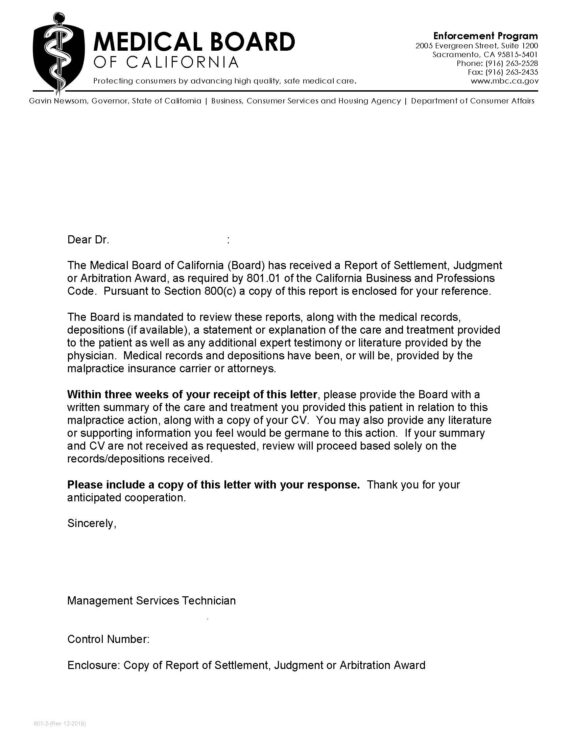As part of its review of quality of care cases, the Medical Board of California sends, to the treating physician, a letter requesting a “statement or explanation of the care and treatment provided to the patient”. These response letters are commonly known as “summary of care” letters. Under Business and Professions Code section 2220.08, when a complaint regarding care is reviewed by the Medical Board of California, the review shall include relevant patient records, a “summary of care”, any additional expert testimony or literature provided by the treating physician, and additional facts or information requested by medical expert reviewers.
After the Board has received notification of a judgment in a malpractice action (801 report) or denial, loss or restriction of privileges (805 report), the Medical Board requests medical records. Along with requesting medical records from the care facility, the Medical Board specifically asks the treating physician for an explanation . The typical form letter asks for a written summary within three weeks of the physician’s receipt of the request letter.

Summary of care letters are a critical opportunity for a physician to explain the care provided and to elaborate on the medical judgments made by the physician. It can be very difficult for a medical expert reviewer, reviewing the medical records, to put themselves in the shoes of the treating physician. For example, it is possible that the treating physician’s care and decisions were informed by looking back at the patient’s treatment history, or that consideration was given to available care options at the facility at the time of treatment.
A well written summary of care letter can also make the case for why the physician’s care decisions were reasonable and prudent. Even with complete medical records, the physician may elaborate about the patient encounter to aid the medical expert reviewer in reaching an opinion. Further, not all medical expert reviewers have the same expertise as the treating physician. Therefore, the summary of care letter can provided needed explanation to prevent potential misunderstandings that can arise when the reviewing physician may need additional insights from the treating physician.
If you have received a summary of care request letter, contact Ray & Bishop, PLC for assistance. Our attorneys can be of great assistance in producing a clear, organized and effective summary of care letter. This single step can be crucial in aiding the Medical Board’s expert reviewer to understand why certain decisions were made and explain that those decisions met the standard of care.


